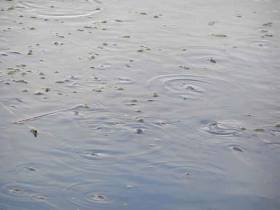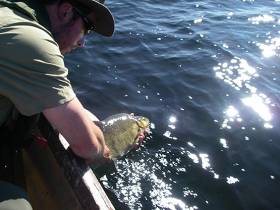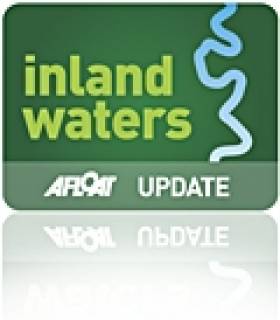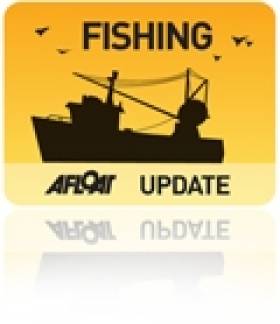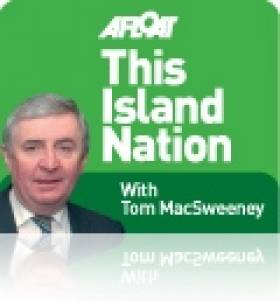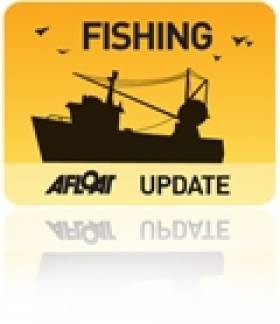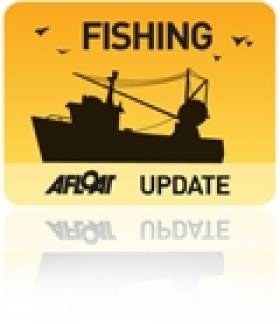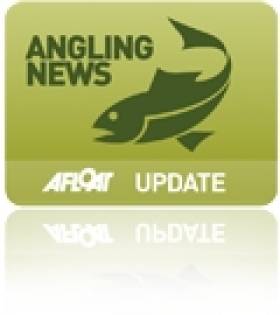Displaying items by tag: Fish
Fish Farmers Challenge Marine Minister
Despite numerous requests for support with rising costs, Irish aquaculture has been ignored, according to the representative body for the country’s fish farmers, IFA Aquaculture.
It has taken issue with a claim by the Marine Minister that he has supported the sector through the Ukrainian crisis.
The Minister’s appearance on RTE’s Prime Time has been criticised, where he said he had supported the Irish seafood sector during the Ukraine crisis. Teresa Morrissey, Executive of IFA Aquaculture, has made a strong riposte: “He hasn’t. As ever, Irish aquaculture has been ignored, despite numerous requests for support with rising costs.
“Some fish feed costs have almost doubled recently. Electricity costs will increase by an average of €100.000 this year for some operators. Raw materials costs have increased. Some of our members estimate they will spend an extra €350.000 over coming 12 months. This is not sustainable for Irish Aquaculture operators and their businesses will no longer be profitable unless there are significant supports during this time of crisis to assist with spiralling input costs.”
Irish Aquaculture has huge potential, says the IFA.
“The State needs to believe in the sector.”
Listen to Teresa Morrissey of IFA Aquaculture below.
Gasping Fish in Distress During Hot Weather – Inland Fisheries Ireland Seeks Help of Public
Inland Fisheries Ireland is asking anglers and the general public to report any sightings of distressed fish which may be caused by high water temperatures and low water levels. Inland Fisheries Ireland is also asking anglers to voluntarily cease using ‘keep nets’ during this period to avoid causing unintentional distress to fish kept for long periods.
The public is invited to make reports of fish in distress to Inland Fisheries Ireland’s 24 Hour Hotline on 1890 34 74 24 or 1890 FISH 24. Inland Fisheries Ireland staff will continue to monitor water bodies for any signs of distressed fish in shallow water, but will be able to react more quickly to timely reports received.
Dr Ciaran Byrne, CEO of Inland Fisheries Ireland, said: “Low water levels and high water temperatures may lead to fish kills. The temperatures are dangerously hot at the moment and fish kills may be unavoidable. In some instances, moving fish may prove too stressful. We would ask anglers practising catch and release fishing during this hot spell to consider taking a break from fishing entirely until conditions are more favourable.”
Inland Fisheries Ireland is also reminding landowners, industry and farmers that as these low water levels and warm water temperatures put additional pressures on Ireland’s watercourses, there is a reduced amount of oxygen in water. As a result, poor quality discharges to rivers and lakes, such as silage effluent or sewage discharges can put additional demands on the oxygen levels, resulting in pollution incidents and fish kills.
Landowners are reminded that abstraction of water from rivers and lakes should be carried out in a sustainable manner to ensure sufficient levels are available for other water users and to protect the aquatic habitat.
Dr Byrne continued: “Our confidential hotline number 1890 34 74 24 or 1890 FISH 24 is available to members of the general public who, in addition to reporting fish kills, can also report incidents of illegal fishing, water pollution and invasive species.”
Inland Fisheries Ireland (IFI) has launched a report on a scientific survey of adult fish stocks in Lough Ree. The report details the findings of a fish stock assessment of the lake undertaken in 2014 to establish the status quo of all fish stocks, with particular reference to the brown trout population.
The assessment was the first time such a large scale extensive survey was undertaken on the lake. As part of the survey, brown trout genetic samples were collected and will feed into the greater Mid Shannon Brown Trout Genetics Study, currently underway in a partnership project between IFI and Queen’s University Belfast. The survey also provided valuable ecological information in relation to the status of invasive species such as zebra mussel (Dreissena polymorpha) and the Asian clam (Corbicula fluminea).
The survey, which was carried out over a two-week period in spring 2014, recorded eight fish species and a number of coarse fish hybrids. Roach were the dominant species with good numbers of roach/bream hybrids also noted. Other fish species present were perch, bream, pike, brown trout, rudd, pollan and tench. Pollan are a listed protected fish species on Annex V of the EU Habitats Directive and Lough Ree is only one of five lakes throughout the country that they are found in.
Dr Cathal Gallagher, Head of Research and Development at Inland Fisheries Ireland, said: “During the Lough Ree survey, eight fish species and a number of coarse fish hybrids were recorded. Almost 52 per cent of all fish noted during the survey were roach, 21 per cent roach/bream hybrids and 16 per cent were perch with significantly smaller numbers of bream, pike, trout, rudd and pollan making up the balance. The information provided from this survey will prove very useful in the context of conserving, managing and protecting such an important mixed stock fishery.”
Dr Ciaran Byrne, CEO of Inland Fisheries Ireland, commented: “Currently Lough Ree can be regarded as one of Ireland’s premier mixed fisheries. Mixed, in this instance, is a reference to three different fish stocks – cyprinid, pike and trout stocks. The status of all of these fish populations is such that, presently, each of them can provide quality angling on a seasonal basis.”
The Lough Ree survey report is available here
Fish Kill Investigation Underway on River Drumcamoge
#fishkill – Inland Fisheries Ireland (IFI) and both Limerick and Tipperary County Council are currently investigating a major fish kill which occurred on the Drumcramoge River on Monday 8th June 2015. On Monday afternoon, IFI was contacted by Limerick County Council regarding a reported pollution incident with a potential fish kill on the River Drumcamoge, a tributary of the Camoge, bordering the counties of Limerick and Tipperary.
IFI Officers attended the site and spent Monday evening and all day Tuesday walking the area both upstream and downstream of the initial site to assess the extent of the fish kill and polluted area.
4,300 fish mortalities have been estimated so far for a 2 ¾ kms stretch of prime nursery area between Ballycahill bridge and Knocklong. The majority of mortalities were juvenile trout and over 100 adult trout broodstock have also been recorded. Other species mortalities include salmon, crayfish, stickleback, minnow and stone loach.
The pollution has been attributed to an agricultural effluent and the source is unconfirmed at this time, but IFI is working closely with both Limerick and Tipperary County Council in investigating the matter.
Amanda Mooney, Director for the Shannon River Basin District, stated, "This is a heavy blow to the river especially with most of this year's juveniles wiped out in a prime nursery area. I am asking the public to report any suspected discharge into any river to the IFI 24 hour confidential hotline 1890 34 74 24.
"At this time of year with lower water levels, rivers and streams can come under significant pressure due to runoff from silage making and slurry spreading. Farmers and contractors are advised to be particularly vigilant".
Inland Fisheries Ireland (IFI) has a 24 hour confidential hotline number to enable members of the general public to report incidents - 1890 34 74 24 or 1890 FISH 24. This phone line is designed to encourage the reporting of incidents of illegal fishing, water pollution and invasive species.
Refreshing the British Environment Agency's Fisheries Service
#fisheries – Following a recent meeting with the Environment Agency (EA) the Institute of Fisheries Management (IFM) has highlighted the importance of the agency employing a strong body of fisheries professionals. The institute says this will enable the agency to deliver its statutory duty to maintain, improve and develop the nation's freshwater and inshore fisheries and to meet the needs of fishing rod licence holders.
The meeting was one of several under the heading of 'Refresh' which the agency has held with stakeholders following a year-long review of its fisheries service.
The IFM is concerned that with a gradual loss over time of expertise, direction and managerial support, the EA's fisheries function is now inadequately resourced and lacks technical vigour and leadership.
"Healthy fisheries are a barometer of how we are interacting with the water environment and we applaud the agency for reviewing its fisheries service," said John Gregory, executive officer of the IFM.
"Clearly the agency's directors have recognised inherent problems in the fisheries function and are looking to improve it."
The IFM asks the Environment Agency:
1. To strengthen its commitment to fisheries in its 2015-2020 corporate plan so that it can maintain, improve and develop fisheries for all.
2. To strengthen its regional fisheries leadership.
3. To support a more robust programme of skills development for its fisheries professionals.
4. To ensure a strong service to rod licence holders particularly by investing in still waters, and
5. To ensure that wherever possible, fisheries management decisions are based on sound science.
#islandnation – The FISH IRELAND Exhibition in Killybegs, the Volvo Race in Galway, the Round Ireland Race at Wicklow, commemorating an Arctic hero in Courtmacsherry and where is the summer for sailing? That's quite a mix of maritime material for one week. At least the Volvo is generating more attention to the marine scene in the general media. It is a regrettable that the same attention is not continued throughout the year.
WICKLOW - FISH, YACHTS AND DENNIS NOONAN
Looking out the window of the Race Office perched high above the quay wall at Wicklow, Dennis Noonan recalled his days of sailing Enterprise dinghies at Baltimore in West Cork:
"They challenged your ability. A mistake at a gybe mark and you could end up in the water. You needed to concentrate, but they were a great way to learn sailing," and he chuckled at the memory, then pointed at the cruisers rafted up at the quayside, tugging at their moorings, seeming anxious to get away: "Offshore racing is a different type of sailing, but no less challenging when you take on the coast of Ireland, no matter what the size of the boat."
Dennis is the doyen of the Round Ireland Race which he was describing to me.
"I've stepped back a bit now," he said, waving at the busy office team putting the final arrangements in place for the start of the race when we talked on the evening before the start. The following day he sent 37 yachts off on their 704-mile voyage. "I have to live by the sea," he told me.
Sailing needs determined people like Dennis who, from his time as a boat builder, continues to build lovely model boats.
MORE FISHING BOATS AT WICKLOW
I noted the number of inshore fishing boats tied up at the quayside in Wicklow, as I am sure crews on the yachts gathered for the Round Ireland start also did. It seems that there is good whelk fishing off Wicklow which has attracted the boats and that the port provides better landing facilities than Arklow which had been the dominant fishing port on the Wicklow coastline.
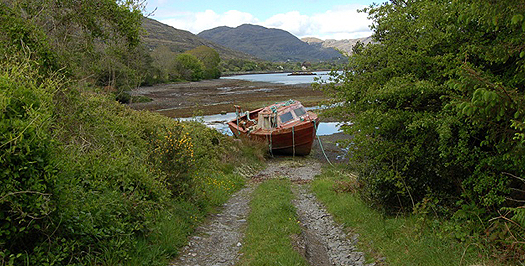
FISH IRELAND KILLYBEGS
These are tough times for the fishing industry and I have been hearing many stories of those difficulties at THE MARINE TIMES FISH IRELAND EXHIBITION in Killybegs. The problems are extensive – from limited quotas to the massive amount of regulations and it is not good to see fishing boats tied up at the quayside prevented from going to the fishing grounds by EU regulations. There are few industries where the official approach is to stop men from working. All this while foreign vessels continue to fish in Irish waters because their quotas are so much larger than those of Irish vessels. There is no doubt that politicians have made a complete mess of the fishing industry.
The small Irish fishing fleet could not have fished Irish waters to the low state of some stocks at present, but this fact is ignored by sensationalist commentaries in the general media where the facts of fishing and maritime life are not understood and there is insufficient expression of an opposite viewpoint. To see areas of Killybegs shuttered which should have viable fish-related industrial activities is disappointing and some of this is due to the attitude of Irish government officials who have frustrated development and stopped proposals which would have created jobs by imposition of unreasonable rents and regulations. It makes me wonder about the government's commitment to job creation.
There are other issues to be addressed, such as the differing reports from environmentalists, scientists, fishermen and leisure anglers about cod stocks. While environmentalists and scientists claim cod has disappeared from Irish waters, anglers report catching more than ever before and fishermen, who are controlled in catching them say the waters are alive with cod. So who is right – those who go out and see for themselves or land-based opinion?
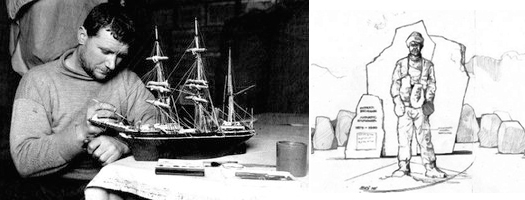
KEOHANE TO BE HONOURED IN COURTMAC
A project is underway in Courtmacsherry in West Cork, I am told, to honour the role of local man Patrick Keohane in Arctic exploration. He was one of those who located the bodies of Robert Falcon Scott and others from the Discovery Expedition of 1901-1904 near the South Pole. The location for a memorial to him is likely to be within view of his birthplace at Barry's Point on the route of the Seven Heads Walkway. A local committee is raising finance for the memorial. Unveiling day is likely to be Sunday, August 19. Well done to the people of Courtmacsherry.
This is an artist's impression of the sculpture.
ARCTIC
According to the Research Council of Norway the Arctic may contain more than a fifth of the Earth's undiscovered oil and gas. Increasing pressure on the region is indicated by shipping cargoes which will reach their highest level through the area this year as companies cut costs and fuel consumption by avoiding the Suez Canal. A thousand tonnes of fuel, costing over $600,000 dollars, can be saved. The environmental importance of the Arctic has been shown by the discovery of a 60-mile bloom of phytoplankton beneath the Chukchi Sea in the Arctic, regarded as "astonishing" by scientists. Phytoplantkon is the essential food of marine life.
WHERE IS IRISH AWARENESS?
Seafarers' Awareness Week, an annual campaign by the biggest charity helping seafarers in need – Seafarers UK – has just concluded. The charity works to raise awareness of Britain's dependence on seafarers and gives annual grants of more than stg£2 million to help seafarers, their families and dependants across the Merchant Navy, Fishing Fleets and the Royal Navy. What a pity there is not something similar in Ireland.
CONCORDIA CAPTAIN CHARGE WITH MANSLAUGHTER
Captain Francesco Schettino who commanded the cruise liner Costa Concordia is now charged with multiple manslaughter, causing the accident and abandoning ship prematurely. Italy's top appeals court has held that he should face the charges, indicating that he was unfit to command.
AMAZON NOW UNDER THREAT
Twenty-two hydro-electric schemes are planned to be built along the Amazon River and its tributaries. Environmentalists and indigenous rights campaigners claim this will alter the environmental and social balance and that the rain forest and tribes which live there will be permanently damaged as locals are removed to for construction work in remote areas. The power schemes are required to meet Brazil's burgeoning demand for electricity as the country develops economically.
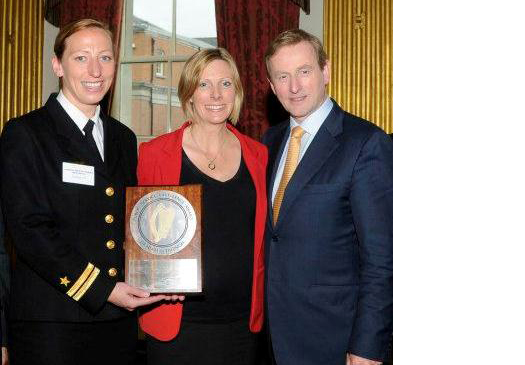
IMERC HONOURED BY TAOISEACH
I was delighted to see that IMERC, the Maritime and Energy Resource Cluster at the National Maritime College in Ringaskiddy, whose work I have praised previously, was awarded this year's "Public Service Excellence Award" by Taoiseach Enda Kenny.
The award highlights the opportunities for job creation and economic growth in the marine sector and the importance of realising the economic potential of Irish marine resources. IMERC was chosen from 190 projects. It is a tripartite alliance between the Naval Service, UCC and the Cork Institute of Technology Development. This is the first time a maritime project has featured in the awards since they were initiated in 2004.
Val Cummins directs the team which is developing the world's largest marine renewable energy research facility at Ringaskiddy. Congratulations to them on their well-deserved award.
Email your comments to THIS ISLAND NATION at [email protected]
Follow Tom MacSweeney on Twitter @TomMacSweeney and on Facebook – THIS ISLAND NATION
Coveney Attempts to End Fish Discards
#FISH – The Minister for Agriculture, Food and the Marine, Simon Coveney TD, in advance of discussions at the EU Fisheries Council, tabled an approach to end the current practice of discarding of fish at sea. Minister Coveney met fishing industry representatives today and discussed these proposals in advance of the EU Fisheries Council which takes place tomorrow Tuesday 12th June in Luxembourg.
The Fisheries Council will focus on ironing out outstanding political issues in the Common Fisheries Policy (CFP) reform package with the aim of achieving a General Council Approach in advance of future talks with the European Parliament. The Reform of the Common Fisheries Policy is expected to be concluded during the Irish Presidency in the first 6 months of 2013. A key element of the reform is addressing the complex problem of fish discards.
The Minister explained that "while there is general political agreement at the Fisheries Council on the overall objective of gradually eliminating discards, the issue that must be solved is how do we practically achieve a new policy that involves arrangements that are practical from a fisherman's perspective". In order to find solutions, the Minister has tabled a new approach which takes into account the real practical difficulties for fishermen of changing practices, the economic impacts and other constraints which impact fishermen in mixed fisheries. The proposal involves delivering a progressive and phased approach to the obligation to land all catches of quota stocks in a mixed fishery context.
Minister Coveney explained "the approach I favour is focused on incentivising changes in fishing behaviour, reducing catches of juvenile fish and allowing fish stocks to grow over a set period. I believe that this approach stands the best chance of getting buy-in from fishermen and in this way effectively delivering more environmentally friendly fishing practices and sustainable fisheries".
On the overall prospects for tomorrow's meeting the Minister said "I am genuinely hopeful that we can reach a consensus at this Council and send out a strong political signal on the Council's vision for a new CFP in advance of the inter-institutional consultations which will follow over the coming months."
Coveney Aims to Ensure fish Stocks 'Not Compromised'
The Programme for Government provides that a Sea Fisheries Sustainability Impact Assessment, based on consultations with stakeholders will be brought before the Dáil annually before EU fisheries negotiations commence. Minister Coveney said "As soon as the EU Commission brought forward its proposals for 2012 TACs and quotas, I initiated a consultation process and asked stakeholders to provide their comments on the proposals. I also arranged a meeting with representatives of stakeholders to assist and inform consideration of the proposals. I have now received the views of the fishing industry and also of environmental interests which I have carefully considered. I presented to the Dáil today a formal assessment which takes account of these views and also the expert contributions from the Marine Institute and BIM".
The Sustainability Impact Statement reviews all the stocks of importance to Ireland taking account of the scientific advice on the stocks. The statement also sets down the economic importance of stocks and the likely impacts from a socio-economic perspective. Minister Coveney said "It is very clear from the analysis undertaken by BIM that the current proposals could have significant consequences on our fishing industry and our dependant coastal communities. Potentially there is a loss of €16m for the fleet operating in the Celtic Sea, a loss of €5.3m for the fleet in the Irish Sea and €1.2m loss in the north-west. This equates to losses in the order of €60 to €65m for coastal communities where the direct cost and indirect costs (processing, net making etc) are taken into account".
Minister Coveney added "We must ensure that the state of fish stocks is not compromised and the scientific advice provided informs decisions on TACs and quotas for 2012. However, this can not mean that a simplistic approach is taken and automatic cuts are applied where full analysis of the stock in not available. We need to make use of all available data in setting next year's quotas so that decisions made are informed and appropriate".
In tandem with the Dáil debate the Marine Institute presented the Minister with 'The Stock Book' produced annually by the Marine Institute (MI). The Stock Book gives the latest scientific advice on the state of those fish stocks that are exploited by the Irish fleet and managed under the Common Fisheries Policy (CFP). Minister Coveney said "The Stock Book is an important element in determining Ireland's position on stocks in advance of negotiations on fishing opportunities at the December Council. I am a keen advocate of fully informed decision making and the information contained in the Stock book is of vital importance in forming our position at the hard negotiations in December".
Killybegs Angler Catches 11lb Sea Trout
The Donegal Democrat reports that a Killybegs angler landed a record-sized sea trout at the Erne esturary in Ballyshannon recently.
John Cunningham, 48, battled for 10 minutes with the 11lb 1oz monster trout before seizing his quarry. He described the experience as "good fun".
The fish was more than five times the average caught in Irish, and beat the previous area record by some 3lbs.
Now returned waters of the Erne, the sea trout will be officially branded a specimen fish by the Irish Specimen Fish Committee.


























